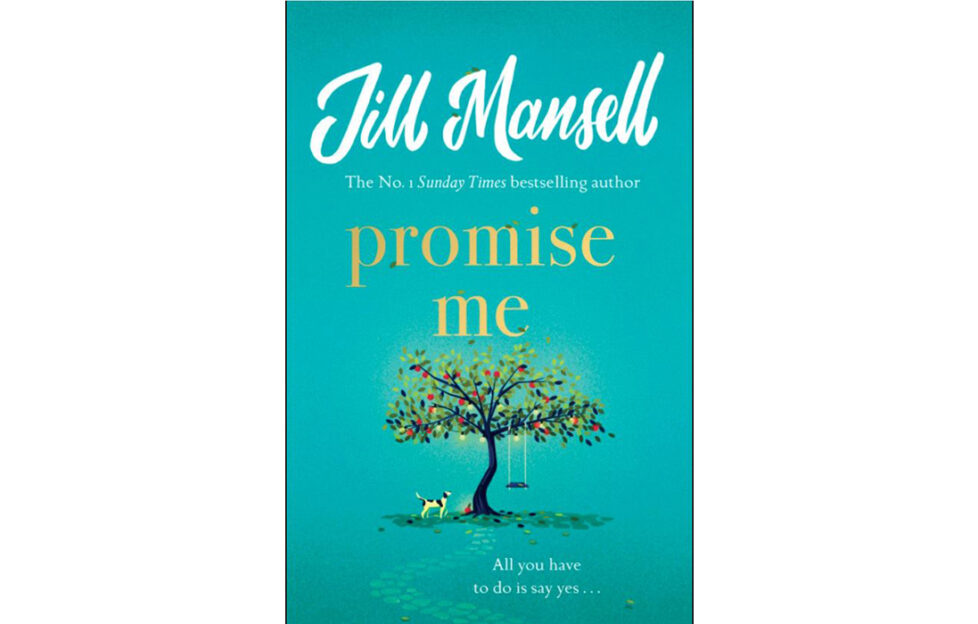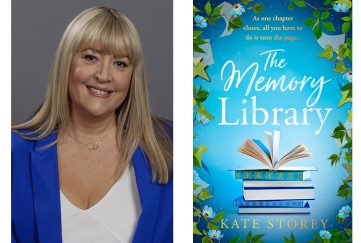Read An Extract Of Jill Mansell’s New Book, Promise Me

Here’s your chance to read an exclusive extract from Promise Me, a warm and perceptive novel of an unlikely friendship.
Fate’s about to make mischief…
One minute Lou is happily employed, with a perfect flat. The next, her home and job have gone. Suddenly she has to start over.
The last thing Lou wants is to move to a tiny Cotswolds village. She certainly doesn’t intend to work for curmudgeonly eighty-year-old Edgar Allsopp. But Edgar is about to make her the kind of promise nobody could ignore. In return, she secretly vows to help him fall in love with life again.
Foxwell is also home to Remy, whose charm and charisma are proving hard to ignore. But Lou hasn’t recovered from the last time she fell for a charmer. She needs a distraction – and luckily one’s about to turn up.
Secrets never stay hidden for long in Foxwell, nor are promises always kept. And no one could guess what lies ahead…
 About the Author
About the Author
Jill Mansell has been writing Sunday Times bestsellers for over twenty years, most recently Should I Tell You? Her hobbies include exploring the Cotswolds and the south-west of England, scouting for locations for future books, and discovering brilliant new restaurants along the way. She lives in Bristol with her family.
Now read the opening chapter of Jill’s latest book…
‘How much?’ The old man ahead of Lou at the supermarket checkout was glaring in disbelief at the female cashier.
‘Oh now, you always say that.’ The cashier was evidently accustomed to his crabbiness. ‘And the prices haven’t changed since last week, my love.’
‘They’re too high anyway. Shouldn’t be allowed. And don’t call me love.’
Paying with his credit card, the man took the plastic carrier she’d packed for him and limped over to the sliding doors, giving them a clunk with his walking stick when they opened too slowly for his liking.
‘One day he might actually say thank you and I’ll fall off my chair in shock,’ the cashier observed with a good-natured smile as she rang up Lou’s bottle of Merlot and box of apple dough- nuts.
‘I’ll say it for both of us,’ said Lou. ‘Thank you, thank you.’
Outside, it was a bright but blustery August afternoon and the old man was still making his way slowly across the car park. As Lou paused at the exit, wondering whether to break into the doughnuts now, she saw him brush past a dilapidated van with its crumpled bumper hanging off.
The next moment, the sharp side of the bumper caught the plastic carrier in his left hand. The man, taken by surprise by the sudden tug backwards, lost his balance and fell to the ground, the bag flinging its contents around him.
Racing over, Lou only had time to say, ‘Are you—’ before the walking stick swung round and clonked her on the head.
Clutching her ear, she yelped, ‘Ow.’
‘And there’s plenty more where that came from, I can tell you.’ The old man brandished his stick fiercely. ‘Help, call the police, I’ve been mugged!’
‘What? There wasn’t any mugger.’ Lou gestured around the empty car park.
‘You tried to mug me. HELP.’
Honestly, what was he like?
‘I’m not a mugger. You caught your bag on that broken bumper there. I came over to see if you’re OK.’
‘How can I be OK when I’ve just been attacked?’
‘Nobody attacked you, you lost your balance and fell over. Look, are you hurt? Do you need me to call an ambulance?’
‘Don’t be ridiculous. I need you to pick up my shopping. Can you at least do that? Look at it all.’
He gestured with irritation at the former contents of his bag, now strewn around them.
‘Fine, let’s get it done.’ There was a gaping hole in the side of the carrier, so Lou stuffed the Merlot and doughnuts into her shoulder bag and used her own.
In less than a minute she’d collected up the assorted tins, packets and ready meals for one.
‘Now, how about you? Any pain?’
The old man shook his head. He’d crumpled rather than crashed to the ground.
‘Want me to help you up, then?’
‘No, I’d just like to sit here like a lemon for the next twenty-four hours. Of course I want you to help me up.’
Lou moved behind him, placing her arms under his and lifting him to his feet.
‘There you go.’ She passed him his walking stick. ‘Right, where’s your car?’
He pointed to an old grey Mini and she accompanied him over to it. When she’d put the bag of shopping in the boot, the old man shook his head and said, ‘Oh for God’s sake.’
‘What’s wrong?’
Producing a pair of spectacles and a single lens from his coat pocket, he held them up so she could see the broken frame.
‘I must have landed on them when I fell.’ He looked at Lou as if it were all her fault. ‘How am I going to get home if I can’t see where I’m going?’
He obviously couldn’t walk any distance.
‘Taxi?’
‘No. Can you drive?’
‘I can, but I don’t have a car at the moment.’
‘That’s not a problem, is it? I do.’ He held out the keys. ‘You can take me home.’
He was saying it as if it were the only option.
‘Where’s home?’
‘Top of the hill. Not too far.’ Then, when she still hesitated, he added irritably, ‘It’s insured for any driver.’
‘And how would I get back?’
‘You’ve got legs, haven’t you?’
Lou heaved a sigh. This was getting silly now; she’d got herself into a situation with a truculent pensioner who was a stranger to manners. And much as she wanted to say no to his demand, her conscience wasn’t letting her.
She knew why, too; it was those ready meals for one. He was grumpy because he was old, in his mid-eighties at a guess. He was on a tight budget and presumably his wife had died. He was lonely and miserable, unable to walk without the aid of a stick and probably in constant pain from rheumatism or arthritis.
She’d noticed the individual meals when he’d lined them up on the conveyor belt in the supermarket, but they’d looked even more heartbreaking strewn around him on the Tarmac out here in the car park.
Plus, she’d always been a soft touch. Of course she couldn’t walk away.
Taking the keys from him, she said, ‘Come on then, let’s get you home.’
His eyes narrowed. ‘And no speeding, either.’
He directed her out of the town and up a steep, winding lane overhung with trees and dappled with sunlight.
‘Keep going,’ he instructed. ‘Mind the bend. Now slow down, it’s up here on the left.’
Lou had been expecting a tiny cottage, maybe a bit dilapidated to match the dented grey Mini with its dusty tyres and scratched paintwork.
‘Where now?’ She paused on the gravelled driveway.
‘You turn the engine off. We’re here.’
‘But where’s your home?’
Irritated, he said, ‘Are you blind? It’s right there in front of you.’
He was gesturing at the majestic Georgian property constructed from custard-coloured Cotswold stone and overlooking the small town like a Roman emperor surveying his subjects. It was solid and square, with symmetrical rows of six-paned sash windows on three levels, a silver-grey slate roof, wisteria climbing up the walls and impressive stone pillars flanking the front door.
Was it one of those grand country residences that had been carved up into many smaller apartments? Or could it be a retirement home? Either way, Lou was impressed.
Switching off the ignition, she ran round to open the passenger door and helped him out before collecting his shopping from the boot.
‘Here you are.’
He didn’t take it.
‘Bring it inside, will you?’
Oh well, it wasn’t as if she was in a hurry to be anywhere else for a while. She waited as he unlocked a door at the side of the property, then followed him along a couple of corridors until they reached the kitchen.
It wasn’t a retirement home, then. Nor, from the look of the place, had it been divided into separate apartments.
‘Will you put the food away for me?’
He located a tube of Superglue in a drawer, then sat down at the scrubbed oak table to fix his broken spectacles.
Lou took a packet of two small frozen fishcakes out of the bag. ‘Where’s your freezer?’
‘Through there, in the utility room.’
She grinned.
‘So ten minutes ago you thought I was a mugger, yet now you’re happy for me to poke around your house.’
He raised an eyebrow. ‘It’s the utility room. I don’t keep sacks of diamonds in there.’
‘Fair enough.’
‘And I didn’t say I was happy either. It’s just a job that needs doing. And my leg hurts.’
The kitchen had a dusty, uncared-for feel about it, as did the utility room. Returning to get on with the unpacking, Lou said, ‘Do you live here on your own?’
He nodded, opened a biscuit tin that was on the table and heaved a sigh upon seeing it was empty.
‘But you have someone to help out?’
‘No.’
Poor man, he sounded so weary, so resigned to being unhappy and alone.
‘Did you lose your wife? I’m so sorry.’
‘What? I don’t have a wife. Never been married.’ He regarded her with fresh suspicion. ‘How can you not know that?’
Lou gave him a look.
‘Maybe I haven’t read your autobiography.’
Realisation dawned. ‘Are you not from around here?’
‘No. I live in Selly Oak.’
‘Sellywhat?’
‘It’s in Birmingham.’ She put the last few items away in the fridge, which was crammed with out-of-date food.
‘You can put the kettle on now. Tea bags are in the blue tin. So what are you doing in Foxwell, then?’ His tone was accusing.
‘Visiting a friend. We were at school together in Cheltenham.’
He was making conversation because he was lonely, she realised, though of course he’d rather die than admit it.
‘What’s her name?’
‘It’s a he. Sammy Keeler.’
‘Keeler? One of the brothers, you mean? Which one’s Sammy – the scruffy one with red hair? Always playing that damn guitar of his?’
As a succinct description, it was spot on.
‘That’s him.’
‘Not your boyfriend, is he?’
‘No.’
‘What’s the other one called?’
‘Remy.’
‘That’s it. Two sugars. And don’t take the tea bag out until it’s done its job.’
Lou’s phone rang as she was stirring his mug of tea.
‘Hey,’ said Sammy, ‘are you there yet? I’m sorry, there’s a problem with the train at Didcot and I’m not going to be home for another hour at least.’
‘No worries, I’m fine. I’m in someone’s kitchen,’ Lou said cheerfully. ‘We met in the supermarket car park, then he broke his glasses so I had to drive him home.’
‘Who is it?’ Having grown up in Foxwell, Sammy knew everyone.
‘I don’t know. He lives in a big house at the top of the hill. It’s Sammy,’ Lou explained to the man sitting at the table. ‘He’s asking who you are.’
‘Allsopp.’
OK, bit of a funny name, but that wasn’t his fault. Going back to Sammy, Lou said, ‘His name’s Allsopp.’
‘Do you mean Edgar Allsopp?’ Sammy started to laugh. ‘Whoa! Are you telling me you’re at Walton House?’
Walton, yes, that had been the name carved into one of the stone pillars guarding the entrance to the driveway.
If she’d been on her own, she might have joked, ‘Are you telling me he’s a mad axe murderer?’ But since Edgar was sitting less than six feet away, she said, ‘That’s right! I’ve just made him a mug of tea.’
‘Good luck. He’s a miserable bugger.’
She flashed Edgar a bright smile. ‘I agree!’
‘But if anyone can handle him, I guess it’s you. Look, I’ll call again in a bit, OK? I should definitely be home by six.’
When she’d put her phone away, Lou fished the tea bag out of her own mug and carried it over to the bin. As she reached it, her foot skidded and she almost went flying into the wall.
‘Clumsy,’ said Edgar.
‘There’s something on the floor. It’s like an ice rink.’ Crouching, she tested the surface with her hand. ‘Did you spill oil on it?’
‘No.’ He bristled. ‘It was butter.’
‘Well, you can’t leave a floor in this state. It needs cleaning up.’
Edgar looked horrified. ‘What, with my knees?’
Shaking her head, Lou located an ancient scrubbing brush in the cupboard under the sink and filled the washing-up bowl with hot soapy water. As she scrubbed away at the black and white tiled floor, she said, ‘You should get someone to come in and do this for you.’
‘I did have someone. She left, same as all the rest of them.’ He pointed at an area beneath a chair. ‘You missed a bit.’
She sat back on her heels and looked at him.
‘Any idea at all why they might not have wanted to stay?’
For a split second, Edgar looked as if he might be on the verge of breaking into a smile. It didn’t happen.
He said, ‘Too lazy, too afraid of an honest day’s work,’ and took a gulp of tea.
‘Strong enough?’
‘How would I know? I didn’t ask them to lift the fridge over their heads.’
It was Lou’s turn to smile. ‘I meant the tea.’
‘Oh. It’s OK, I suppose. Could do with a bit less milk.’
When she’d finished scrubbing the floor, she said, ‘Look, why don’t you write out an advert and let me put it in the newsagent’s window for you? I can do it when I leave here. Get yourself someone who can come and tidy the house up once or twice a week, how does that sound?’
He sighed as loudly as if she’d asked him to run a marathon. ‘I’d need them here more often than that.’
‘Fine, then say it!’
She found a pen on the dresser along with a battered tear-off pad. When she placed them in front of him, Edgar said, ‘You can write it. Six mornings a week, general cleaning, cooking and helping out.’ He paused, then added generously, ‘They can have Sundays off.’
Lou wrote everything down as he dictated his phone number. When it came to the hourly rate, she said, ‘Employers generally pay a bit more than that,’ and with a sigh of annoyance, he upped it.
‘I’ll take this to the newsagent’s and copy it out onto one of the postcards so it’ll slot into the message board in the window.’ She dropped the folded sheet of paper into her bag. ‘What’s the name of the woman who runs the shop?’
‘How would I know?’
‘How long have you lived here?’
‘I was born here. Moved to London, then came back thirty years ago, after my parents died.’
‘In that case, maybe you should find out her name. She’s lovely, really friendly. We had a great chat while she was watering her hanging baskets outside the shop.’
‘Hmph. Wait a minute.’ He held out the pen as Lou hoisted her bag over her shoulder. ‘Write down your number before you go.’
‘Why?’
‘Because I might want to call you. How long are you down here for anyway?’
‘Just the weekend. Heading home on Sunday.’ Scribbling the number on the notepad, Lou was briefly tempted to get it a bit wrong. But no, she couldn’t bring herself to do that; it wasn’t the kind of person she was.
‘Do you have a job?’ said Edgar.
‘I do. I work as a carer. And I love it,’ she added, because people sometimes liked to question her choice of career and she didn’t need to get into that right now.
‘Got kids?’
‘No.’
‘Husband?’
‘Not any more.’
‘Left you, did he?’
‘Kind of. He died.’
At this point, anyone else would have exclaimed, ‘Oh my goodness, how terrible. I’m so sorry.’
Not Edgar, though.
‘When did that happen, then?’
‘A year ago.’ Just over eleven months. Near enough.
‘And how did he die?’
‘Covered in trifle.’ Lou winced; she hadn’t meant to utter those words aloud. They’d spilled out in response to the mental image her brain had conjured up.
After a second’s startled silence, Edgar gave a bark of laughter. It sounded rusty, as if he wasn’t used to doing it, which didn’t exactly come as a surprise. He put down his mug, sloshing tea over the rim onto the table.
‘What does that mean?’
It was wrong of her to have said it. She shook her head and moved towards the door.
‘Nothing. No need to get up, I’ll see myself out.’ Not that he’d shown any sign of rising from his chair. ‘And don’t worry, I’ll put the ad in the newsagent’s window.’
‘Bye.’ Edgar had already lost interest and was dragging a copy of last Sunday’s Telegraph across the table towards him.
Lou left the house and pulled the heavy door shut behind her. Of course he hadn’t said thanks. Just as well her choice of career meant she was used to dealing with all kinds of people. Even cranky, ill-mannered old men like Edgar.
Promise Me by Jill Mansell is published on January 19, 2023 by Headline Review, £16.99 HB.
Pick up My Weekly magazine (in newsagents and supermarkets every Tuesday) for lovely new short stories by big-name authors and favourite writers. A subscription could save you loads on the shop price!





